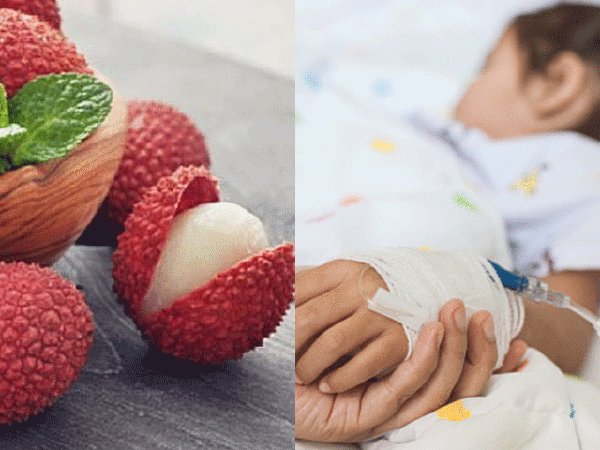Does eating litchi causes encephalitis?

Encephalitis (Chamki Fever) is a disease that causes inflammation of brain. In Muzaffarpur, many victims of encephalitis had very low sugar levels. The disease has caused deaths of over 110 children in Bihar, this year. Here, we bust the myth regarding consumption of litchi causing encephalitis.
What is Acute Encephalitis Syndrome (AES)?
Acute encephalitis syndrome (AES) tends to affect central nervous system, mostly in children and young adults. It is a viral disease, which causes mild flu-like symptoms such as high fever, convulsions and headache.
What are the causes?
AES is complex and can be caused owing to the virus, bacteria, fungi, and a range of agents. Moreover, one may also suffer from it due to the scrub typhus, dengue, mumps, and measles, even Nipah or Zika virus. In several cases the causes of AES remains clinically unidentified. However, according to a study published in the journal Annals of Neurosciences in 2016, apart from viral encephalitis, severe form of leptospirosis and toxoplasmosis can cause AES. The causative agent of AES varies with season and geographical location, and predominantly affects the population below 15 years.
The connection between litchi fruit and encephalitis
The recent outbreak of Acute Encephalitis Syndrome (AES) in Bihar, which claimed more than 110 lives so far has caused the wave of fear amongst many patients. Hence, parents have an important question which is should their children eat litchi? This is because, it is being confirmed that encephalitis is spreading in litchi growing areas of Bihar, including Muzaffarpur district and other parts of the country, and that consumption of the fruit was among the most common factors for the spread of the disease.
Speaking about the benefits of litchi, it is a good source of vitamin C, vitamin B2 (riboflavin), potassium and copper. It is loaded with antioxidant, anti-cancer, anti-inflammatory, anti-microbial, anti-viral properties. Furthermore, it is anti-diabetic, anti-obesity, liver-protective and immune-boosting in nature. Also, it is rich in polyphenols (plant-based antioxidants), including proanthocyanidins, which may help prevent serious heart problems and cancer.
Myth regarding consumption of litchi causing encephalitis
It is essential to note that the cause of encephalitis includes sleeping on an empty stomach at night, dehydration due to humidity and eating litchi on an empty stomach. During early morning, there is normal tendency for blood sugar to dip, after several hours of no food intake. Undernourished children who may have gone to sleep without a meal at night develop hypoglycemia (a condition that occurs when a person's blood glucose level (BGL) has dropped too low, below 4mmol/L). The brain needs normal levels of glucose in the blood. The liver is unable to supply the need. So the alternate pathway of glucose synthesis, which is known as fatty acid oxidation, is turned on. That pathway is blocked by Methyl Carboxy Phenyl Glycine (MCPG). Thus, litchi does not cause any harm in well-nourished children, but only in undernourished children who had eaten litchi fruit the previous day and had gone to bed on empty stomach.
Why this toxin can be harmful for undernourished children?
When it comes to well-nourished children, reserve glucose gets stored as glycogen (glucose polysaccharide) in their liver. Thus, during instances when the glucose level goes down, the glycogen is broken down into glucose and circulated in the blood for use. But, when it comes to undernourished children (who belong to poor families), they tend to lack adequate glycogen reserve that can be converted into glucose. The reason is, the natural mechanism in undernourished children is unable to correct the glucose level their blood, and thus can cause hypoglycemia.
Generally, when glycogen reserve in one’s liver is exhausted or is insufficient, the body tends to convert the fatty acid (non-carbohydrate energy source) into glucose. But in the presence of the litchi toxin, the fatty acid conversion into glucose is blocked mid-way owing to which no glucose is generated and the low blood glucose level is not corrected by one’s body.
Take-home message
As you know that the hungry children may eat unripen litchi that fell on the ground, containing high levels of a naturally occurring amino acid derivative called hypoglycin, which inhibits the body's ability to produce glucose, causing hypoglycemia (low blood sugar). This fruit is eaten in various countries around the world without issue. The key lesson we can take from the children in India is to avoid eating unripen litchi in an empty stomach. If you are well-nourished and eating ripe litchis in moderation, you don’t need to worry!
Disclaimer: Tips and suggestions mentioned in the article are for general information purposes only and should not be construed as professional medical advice. Always consult your doctor or a professional healthcare provider if you have any specific questions about any medical issue.















































